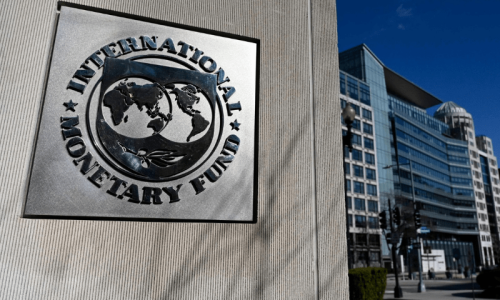WASHINGTON: Along coastlines from Australia to Kenya to Mexico, many of the world’s colourful coral reefs have turned a ghostly white in what scientists said on Monday amounted to the fourth global bleaching event in the last three decades.
Fifty-four countries and territories have experienced mass bleaching among their reefs since February last year as climate change warms the ocean’s surface waters, according to the US National Oceanic Atmospheric Administration’s (NOAA) Coral Reef Watch, the world’s top coral reef monitoring body.
Bleaching is triggered by water temperature anomalies that cause corals to expel the colorful algae living in their tissues. Without the algae’s help in delivering nutrients to the coral, the corals cannot survive.
“More than 54 per cent of the reef areas in the global ocean are experiencing bleaching-level heat stress,” Coral Reef Watch coordinator Derek Manzello said.
Announcement of the latest global bleaching event was made jointly by NOAA and the International Coral Reef Initiative (ICRI), a global inter-governmental conservation partnership. For an event to be deemed global, significant bleaching must occur in all three ocean basins — the Atlantic, Pacific and Indian — within a 365-day period.
Like this year’s bleaching event, the last three _ in 1998, 2010 and 2014-2017 _ also coincided with an El Nino climate pattern, which typically ushers in warmer sea temperatures. Sea surface temperatures over the past year have smashed records that have been kept since 1979, as the effects of El Nino are compounded by climate change.
Corals are invertebrates that live in colonies. Their calcium carbonate secretions form hard and protective scaffolding that serves as a home to many colourful species of single-celled algae.
Scientists have expressed concern that many of the world’s reefs will not recover from the intense, prolonged heat stress.
“What is happening is new for us, and to science,” said marine ecologist Lorenzo Alvarez-Filip at the National Autonomous University of Mexico.
“We cannot yet predict how severely stressed corals will do,” even if they survive immediate heat stress, Alvarez-Filip added.
Recurring bleaching events are upending earlier scientific models that forecast that between 70 per cent and 90 per cent of the world’s coral reefs could be lost when global warming reached 1.5 degrees Celsius above pre-industrial temperatures.
To date, the world has warmed by some 1.2 C. In a 2022 report by the UN Intergovernmental Panel on Climate Change, experts determined that just 1.2 C of warming would be enough to severely impact coral reefs, “with most available evidence suggesting that coral-dominated ecosystems will be non-existent at this temperature”.
This year’s global bleaching event adds further weight to concerns among scientists that corals are in grave danger.
“A realistic interpretation is that we have crossed the tipping point for coral reefs,” said ecologist David Obura, who heads Coastal Oceans Research and Development Indian Ocean East Africa from Mombasa, Kenya.
Coral reefs are estimated to provide some $2.7 trillion in goods and services every year _ with benefits such as attracting tourists, protecting coastal communities from storm surges, and supporting coastal fisheries, according to a 2020 valuation by ICRI’s scientific network.
Published in Dawn, April 16th, 2024












































Dear visitor, the comments section is undergoing an overhaul and will return soon.